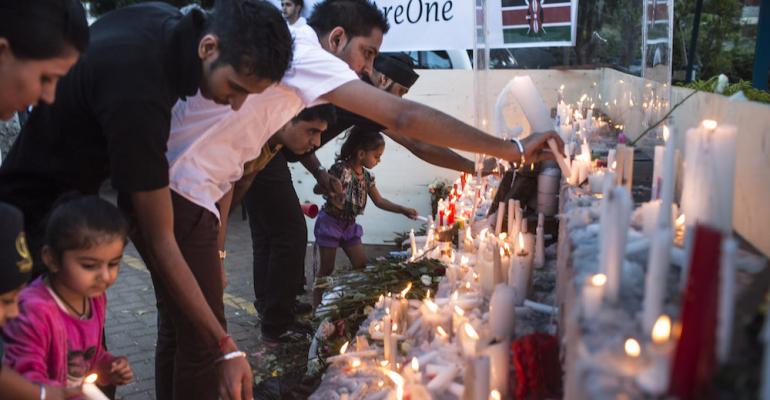David Lau, U.S. Army (retired) and a counterterrorism and security professional who currently delivers training to U.S. federal agencies and is an international team leader with the Federal Air Marshal Service, gave a MeetingsNet webinar on active threats and the global hospitality industry.
Although it is uncomfortable to think about, meetings and hospitality professionals have to consider how they should respond to threats at their events.
Lau began by posing the question: Why should the meetings industry prepare for an active threat?
The first reason is that hotels are an attractive target. Before 9/11, terrorist organizations hit hard targets like the embassies in Nairobi and Tanzania and the destroyer U.S.S. Cole. But those kinds of targets have been hardened as security levels have increased. Lau says that terrorists know they can get the same effect from hitting a Western-brand hotel where ex-pats typically stay. “You can only harden a hotel so much because it is supposed to be inviting,” Lau says. “If it looks like Fort Knox, people are not going to want to stay there.”
Lau gave three examples of hotels that have been targeted in the last three years. The Radisson Blu at Bamako, Mali, in November 2015 with the loss of 20 lives; the Splendid Hotel, Ouagadougou, Burkina Faso, in January 2016 where 29 people were killed; and the Étoile du Sud hotel in Grand-Bassam, Ivory Coast, in March 2016 where 18 guests were murdered. He said, “In my day job, I teach a course for doctors with the Centers for Disease Control and one of my students happened to be in the Mali attack. Thankfully, she survived and is able to share her story with others.” Lau says these attacks show the modus operandi of the terrorist organizations; they want to attack Western hotels because they want to kill westerners. They also want to encourage copy-cat attacks in the U.S. When al-Shabaab, a terrorist organization, attacked the Westgate Mall in Nairobi, Kenya, they sent an open letter to sympathizers in Minneapolis-St. Paul urging them to do the same thing there.
Lau urged meeting planners to read publications with overseas reporting desks as international attacks are often templates for attacks on home soil.
Another way Lau urged planners to prepare for this type of emergency is by preprogramming or practicing “OODA loops.” This is an acronym for Observe, Orient, Decide, and Act. He said that studies show the average response time when a human is confronted by something traumatic they have never prepared for is eight to 12 seconds. By mentally preparing planners can cut that response time in half. Lau says, “This doesn’t mean being paranoid; it means accepting that this is the world we live in and being prepared.”
As part of the Observe component of OODA, be aware that not every active threat will be an active shooter. It could be homemade explosives, a knife, or car attack. In the overseas hotel attacks, most of the casualties took place in the lobby and the first floor, those who were in other areas were able to hide or escape.
Recognize Signs of Terrorism
Lau says people in the meetings industry go to so many events they know the people and the environment and therefore are at an advantage when it comes to spotting something that is not quite right. Terrorists and criminal gangs tend to stick to a similar planning cycle first adopted by the Irish Republican Army.
1. Broad target selection. They look for large groups of people such as at a concert or convention center who are in unfamiliar environments so more likely to be confused and less able to escape or defend themselves.
1. Intelligence gathering and surveillance.
2. Specific target selection.
3. Pre-attack surveillance. Someone from the organization will physically check out the location. For example, a florist with stores in two hotels in Indonesia gave information to a group that bombed them.
4. Rehearsal. This could be a dry run where they leave a disable near the hotel or venue to see how long local police let it sit there.
5. Execution. The attack.
6. Escape and exploitation. Not all attackers want to die in place. If you see an attacker trying to escape, don’t try to interfere, but point out to law enforcement if you can.
Lau says If you witness what you think is pre-attack surveillance or a dry run, point it out to the security manager at the venue. Don’t try to excuse the activity; it never hurts to check. You and your staff know what normal behavior, clothing, and activities look like in this environment, if you see something, say something.
Lau advises planners who are facing resistance from their employers on training or even simply handing out safety information to event attendees to stress that meeting professionals are in a leadership role with a lot of lives at stake. If attendees look to them for the Wi-Fi password, they will definitely look to them in an emergency, he says. If there is still resistance to having an emergency plan in place or choosing venues with security features and training, he suggests explaining the financial liability they could face if they fail to take reasonable safety measures. Preparedness is part of due diligence.





